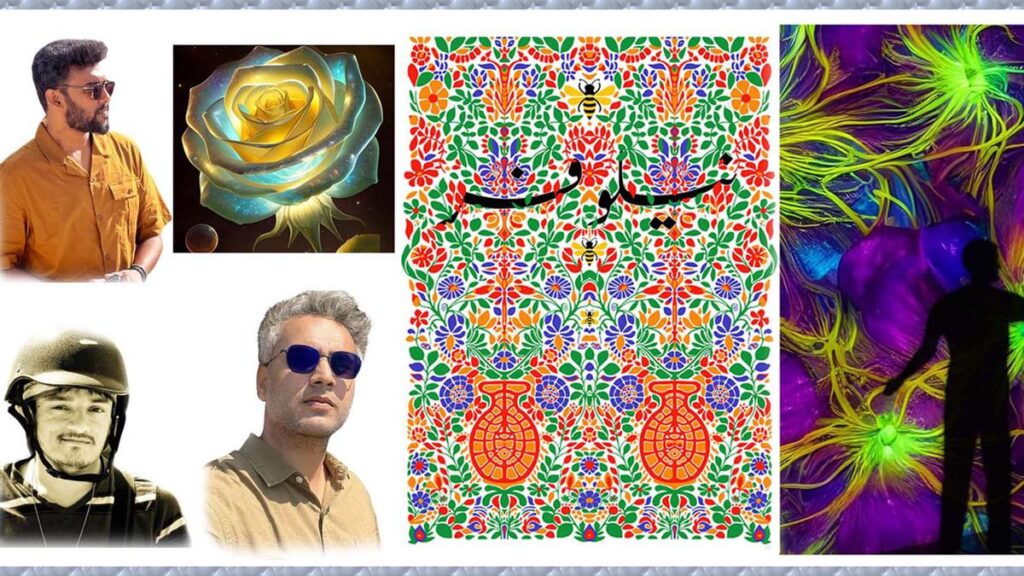With a keen interest in technology and art, Tanvir Nagore, Mehdi Saajid, and Trilok Chander are presenting an immersive showcase of new media art at Goethe Zentrum, Hyderabad. The exhibition ‘Synchronised Spectrum: How Bees See Flowers’ brings together varied facets of the city – Cyberabad and its technological strides and the cultural ethos of the Old City.
The trio believes that art can be fun when it offers visitors an interactive experience rather than passively viewing a painting or a sculpture. On one wall of the Hamburg Hall at Goethe Zentrum is a large installation featuring rows of illuminated floral structures on a panel. Mehdi explains that this “digital kinetic sculpture” will help humans view flowers the way bees do.
To understand the idea behind this installation, we have to recall science lessons. Bees have compound eyes composed of thousands of tiny lenses called Ommatidia. “These lenses work together to create a mosaic , which allows bees to see a wider field of view than humans. Bees can see flowers in ultraviolet light that is not visible to the human eye. The digital kinetic sculpture will replicate that vision for humans,” Mehdi explains. Tanvir elaborates that facilitating humans to “be a bee” and look at flowers in a different light will help further the understanding of how flowers evolved to attract certain bees.
Mehdi is a new media artist who has been fascinated with the idea of the coming together of art, design, and technology. A designer from the the National Institute of Design, he crossed paths with technophile Tanvir Chander who has been working in the area of esports and video games for about 15 years and has a penchant for art, and creative technologist Tanvir Nagore who has a background in engineering, management, and digital fabrication. This is their first collaborative exhibition.
On another side of the hall is a large LED panel with floral imagery. The sensors can track the hand movements and postures of visitors who stand in front of the panel. The installation can give viewers an idea of how the tiny bees get immersed in the large flowers. The movement of human hands from one flower to another can also replicate the act of cross-pollination.
Another installation has multiple images facilitated by robotic machines. Tanvir says the trio was intrigued by the mathematical accuracy of symmetry and patterns in flowers. Based on trigonometric equations of such symmetry, the robot generated wave-like patterns and straight lines to create artistic patterns.
The old and the new come together in another series anchored by a fictional female superhero named Ninja-Bee. “She is Niloufer; she hails from the Old City, studies Unani medicine and has her superpower drawn from the bees,” says Trilok.
Mehdi points out how flowers are a part of the tangible and intangible heritage of the Old City – Unani medicine, the floral patterns that adorn the Badshahi Ashurkhana, the floral motifs on the dastar khana cloth in Deccan households, and the Zinda Tilismath. “An entire universe is built around flowers but we do not know it,” he says. Hyderabad Deccan: Illustrated, the book that Mehdi co-authored with his friend Sibghat Khan, also finds space in this installation.
Ninja-Bee navigates old and new Hyderabad accompanied by her friend Mrinal, again fictional. The artists show through a series of paintings, tweaked with AI (artificial intelligence) to portray the shift in politics, identity and freedom of women over the decades.
New media art, powered by technology, is a nascent concept and the artists believe that Hyderabad, with its intersection of technology, art, and culture, can contribute to this sphere through such exhibitions.
(Synchronised Spectrum: How Bees See Flowers is on view at Hamburg Hall, Goethe Zentrum, Banjara Hills, Hyderabad, till August 20.)
This content was originally published here.



